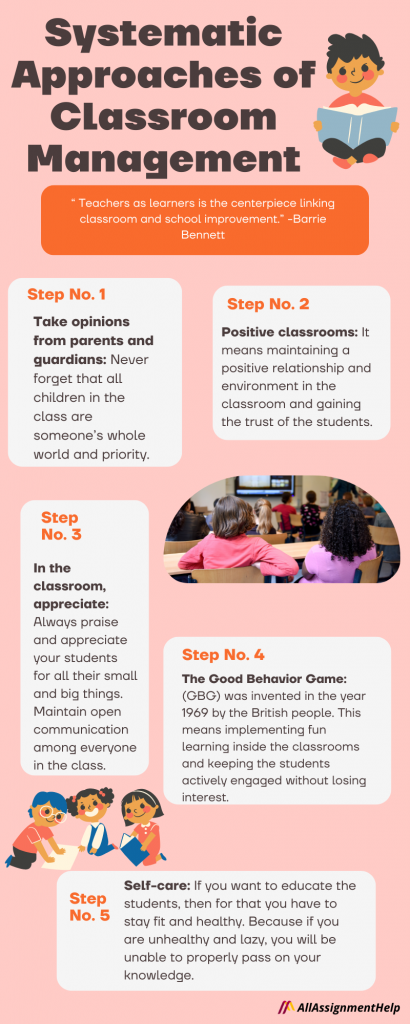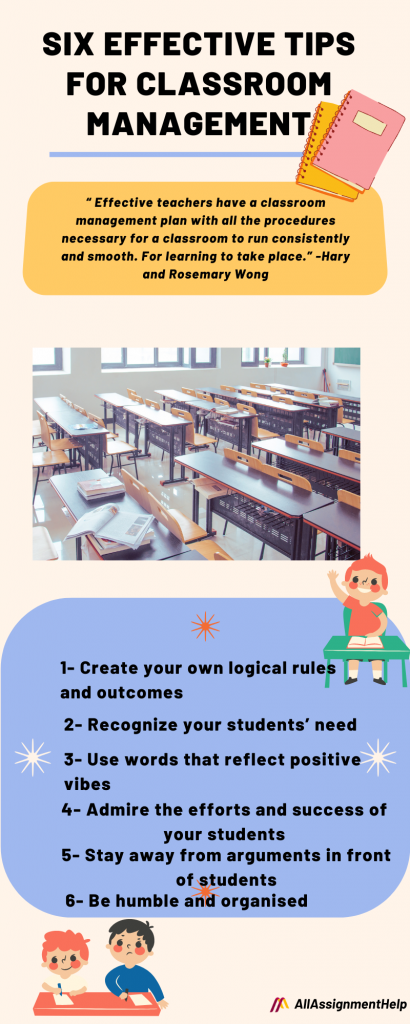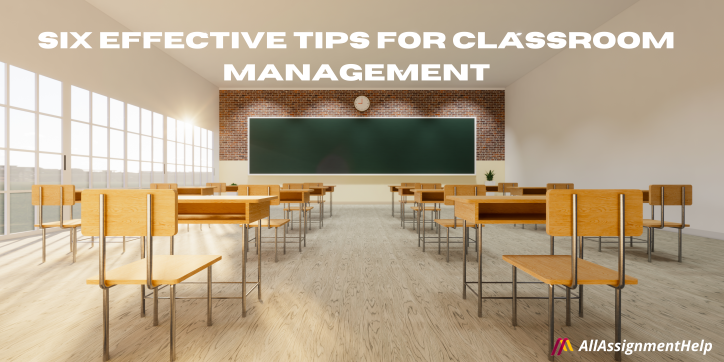Classroom management is a process followed in schools and colleges to maintain effective behaviour among students. Some examples are modelling ideal behaviour, non-verbal communication, etc. This is implemented and invented by the teachers and management to positively develop the academic engagement of the children. It should be used in every institution as it promotes equal relationships among all. It also increases academic knowledge and decreases bad behavioural habits. But if we see according to the students’ perspective, then classroom management can be difficult at times. Because here they are required to be bound by the rules and regulations and work accordingly. Any student with poor management skills might get punished. If we put it in simple words, this is all about different strategies and rules imposed on the students.
This blog is brought to you by Allassignmenthelp.com. In this blog, we will learn about the six effective tips for classroom management. We will also different classroom management styles and approaches.
Why Is Classroom Management Important?
In the early stages of schooling, the teachers find it difficult to control the students of the classroom. That is when classroom management came into existence. It consists of different strategical approaches and styles which helped the educators to effectively manage the learners. It measures the teachers teaching ability and the students learning and understanding ability. The teachers adopt various methods to smoothly run the lessons in the classroom. It develops the discipline among the students and implements flexible learning activities. The different classroom management style helps to gain a piece of better knowledge in the class.
“ In an effective classroom, the students should not only know what they are doing. They should also know why and how.”- Harry Wong
Systematic Approaches of Classroom Management

The approaches to classroom management are as follows:
- Positive classrooms: It means maintaining a positive relationship and environment in the classroom and gaining the trust of the students. It proves their self-power and motivates them in a better way.
- The Good Behavior Game: (GBG) was invented in the year 1969 by the British people. This means implementing fun learning inside the classrooms and keeping the students actively engaged without losing interest. This can be popular among pre-schoolers and adolescents. It means giving a particular task to all students and awarding the best one among them who finishes the work first.
- In the classroom, appreciate: Always praise and appreciate your students for all their small and big things. Maintain open communication among everyone in the class. Your small words can motivate them in a big way.
- Self-care: If you want to educate the students, then for that you have to stay fit and healthy. Because if you are unhealthy and lazy, you will be unable to properly pass on your knowledge. Maintain a healthy environment both inside and outside of the class.
- Take opinions from parents and guardians: Never forget that all children in the class are someone’s whole world and priority. Try to involve the parents and guardians of your students in the activities of your class. Keep them updated with everything.
Also Read: Is classroom lecture dying nowadays?
Six Effective Tips for Classroom Management
Effective classroom management reflects the dignity of a teacher. It will give a better result for each batch of students. A classroom is a place where there are nearly 50-60 students, and each one has different behaviours. Teachers are the ones who can manage all the children and develop an environment where they can effectively learn and gain knowledge. If you ask me, who are the class managers and what do they do? Without a doubt, the teachers are the class managers, and they develop a friendly relationship among the students and implement fun learning activities.

“ Teachers as learners is the centerpiece linking classroom and school improvement.” -Barrie Bennett
Below are six tips for effective classroom management that will give you extraordinary results:
Create your own logical rules and outcomes
It is not all about how strict you are in the classroom; it is all about how you can maintain discipline without being a boring teacher. Try to be a friend to your student and guide them in the right direction. Help them to overcome the difficulties, whether they are subjective or other things. Along with being friendly, you should also behave like a good teacher inside the classroom, who can clear up doubts and punish the wicked. You should know the limitations of being set free because if you start being too cordial with the students, they might get distracted and break the rules.
Recognize your students’ need to be more responsible and self-assured in the classroom
Form certain rules together as a class, giving confidence to those with controlling personalities. Direct them to in-class debate, and walk around as an alternative to standing upfront for the whole lesson so that you are not the focus of the conversation. Try to break the shyness of the students and make them more confident and smart. You should implement two-way communication in the classroom to break the ice between the students and teachers. Rather than always having the teacher speaking and the children listening, You can change it to make the students speak their knowledge, and you can listen to it and correct it whenever they get wrong.
Use words that reflect positive vibes
Always use positive words instead of negative ones. As quickly as you instruct someone not to do something, the first image in that person’s mind is that what you instructed is negative. To keep away from the meddlesome subconscious, choose positive language as a replacement for negative language. If the students have done anything wrong, or if they are doing something wrong, then deal with the situation smartly. Instead of scolding or punishing them, you can make them realise their mistake and correct it by themselves.
For example:
- Say “be prepared” as an alternative to “don’t forget your assignments.”
- Advice to “shut the door quietly” rather than “don’t bang the door.”
- Advice to “listen to the teacher and peers” as an alternative to “don’t talk in class.”
- And use the word “consequences” despite the extremely negative “punishments.”
Admire the efforts and success of your students for their sake only
Give regular comments about good behaviour; do not give importance to bad behaviour or habits. Students should not do good things just to gratify the teacher, to score good marks or to be in their good books. Everything good that the children do should come from their hearts. They must understand what they are doing and should try to follow it in the future too. The teachers should regularly check on the working activities of the students and should appreciate it if they have done something good. Every single effort must be acknowledged as it can motivate the learners.
Stay away from arguments in front of students
It is not a good idea to make an example of a student by embarrassing him or her in front of their classmates. If you are handling misbehaviour, talk to the student in the corridor or after class to solve the matter rather than inside the classrooms. If you want to solve the arguments between two students, then you must fully listen to the whole thing before jumping to a conclusion. All the children in the classroom are important, so the educators must treat them equally.
Be humble and organised
If you are organised and humble, your student will be unable to point out any flaws in you. The arrangement, both within a session and throughout the academic term, will assist your students to continue at the top of their work. Schedule the activities of the day on the board before any class. Declare the module of the syllabus at the start of the semester and continue with it. If, in any case, you get off track, give a revised syllabus so that students are always familiar with the thing that is where they are in the course. Throughout the class, be ready for each ensuing action; lag time misuses both your and your students’ time and introduces a lack of concern into the classroom. So be organised!
These tips are not only for the classroom teacher; they are also for all the teachers in the school. Whether it be a subjective teacher, a physical teacher, or a substitute teacher, they just need to follow them and adjust them according to their students’ needs. If the teachers try and adapt these strategies in their classroom, then they can see growth in the academics of the students. If not, the students can get help from an assignment writing service and get a good understanding of academic courses.
“ Effective teachers have a classroom management plan with all the procedures necessary for a classroom to run consistently and smooth. For learning to take place.” -Hary and Rosemary Wong
What Are the Different Classroom Management Styles to Explore?
Classroom management is the most important thing to be included in the schools if the teachers want the students to score good marks. The four types of classroom management are:
- Authoritarian
- Authoritative
- Permissive
- Indulgent
Authoritarian:
Having full control over the classroom and students is called as authoritarian. Here, the educators are like the rulers and they implement only one-way communication inside the class. There is no involvement of the students and they are just bid to follow the rules. This management style is not flexible as there is no trace of teacher and student relationship.
Authoritative:
It is a balanced classroom management style where there is two-way communication. Here both the teachers and students actively participate in the classroom. To make the learning better and understandable, the children’s ideas and feedback are welcomed and included.
Permissive:
The permissive management style has low involvement from the teachers. They do not show interest in the planning of the learning and let the students do their thing. In this style, there are fewer chances of learners scoring good grades as the teachers do not make efforts to educate them. Students studying in this style often struggle to maintain good marks in their exams. To get high scores in their midterm and final exams, they start searching. I need someone to take my online test for me on Google.
Indulgent:
Here there is a low level of control and a high level of involvement from the student’s side. Here the teachers let the students speak in the class. But they misuse this freedom and take over the entire class to the bad side. This is not a good thing as the teachers are the managers and should have control in the classroom. Some students feel safe and secure in this classroom management style.
We understand that each teacher has their own unique teaching style and will teach accordingly. Are you having trouble teaching your classroom management style? Then I would suggest you choose the approach with which you are comfortable. You can also consider your student’s outcomes. Planning is very important. After the selection process, plan everything you do to have a positive result.
“ To this end, the greatest asset of a school is the personality of the teacher.” -John Strachan
Refer: How to develop strategies for students to attend the classroom?
About Us
We are one of the best online academic service providers and can help you with all of your academic assignments. Students who came to us with queries like, Can you take my online course? have always achieved an A in their classes. Our service is available in the United States, the United Kingdom, Australia, and Canada. We have emerged as a global leader, operating in over 20 countries and employing over 4,000 experts in their respective fields. If you are a student and are having trouble with your writing, please contact us right away. We have a solution for every academic issue.
Frequently Asked Questions
| Question 1: How should students who misbehave in class be taught? Answer: They are the students who can be found in every school. Their main intention is to disturb the class and get some enjoyment. They want to be at the centre of the light at any cost. If you want to manage those students, then the teachers should be careful and stop them before they start. With this, they can maintain a good learning process. |
| Question 2: What are the three C’s that can help in classroom management? Answer: The three “c’s” are connection, consistency, and compassion. If a teacher and students follow these things, then they effectively manage their classrooms in a good way. |
